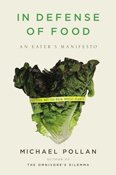If someone told your grandmother that the very food on her plate would one day need protection from her culture, she might have laughed herself silly all the way to a slice of homemade blueberry pie. "Our food in need of defense? Nonsense! Now, have a second serving of my green beans from the garden," she'd advise. But we've managed to find ourselves in just that pickle. Anyone reared during the great "Age of American Nutritionism" is well aware that foodreal honest-to-goodness foodbegan slowly disappearing from our nation's grocery shelves in the 1960s. And grandmother has had increasingly less influence on our dinner choices ever since.
Michael Pollanbest-selling author of "The Omnivore's Dilemmaԗisn't going to have any part of it. In "Dilemma," Pollan investigated America's various food chains and their subsequent ethical and ecological consequences. In his latest critique on our industrialized food system, "In Defense of Food" (The Penguin Press, 2008, $21.95), Pollan picks up the conversation where he left off, and turns his attention to the individual American eater.
The book begins with the startling realization that Americans have allowed food-like substances, the food-science industry responsible for their creation and a $32 billion food-marketing machine to take hold of their health.
"[T]he 'What to eat' question is somewhat more complicated for us than it is for, say, cows," Pollan writes. "Yet for most of human history, humans have navigated the question without expert advice. To guide us we had, instead, Culture, which at least when it comes to food, is really just a fancy word for your mother."
But mom has lost the battle over the dinner menu, and she's lost it to what Pollan refers to as the ideology of nutritionism: understanding and engaging in food and our bodies in terms of nutritional and chemical constituents, instead of what traditions dictate. This reductionist view is risky business; many would argue it has, paradoxically, left us the least healthy nation in the world.
We're overweight, but undernourished. We're fanatical about tracking the latest invisible nutrients deemed "good" or "bad" by food science. We are a nation of orthorexics; obsessed with being and eating healthy. Yet, a great number of the Western Diseases still plague us: obesity, hypertension, diabetes, heart disease, stroke and cancer. Worse still, we've ruined an innumerable amount of meals (and the fundamental pleasure derived from taking food) by adopting the nutritionist mentality.
Why then, did Americans shift away from cultural eating while other Western societies didn't? Why is it that an American sees a slice of chocolate cake and thinks, "guilt" while a French woman thinks "celebration"? And why do we consider it a paradox that their daily consumption of rich foods and wine have left them healthier than us still?
It's a complex political mess that lead, us down this path, but ultimately, it began in 1977 with Sen. George McGovern's chairmanship of the Senate Select Committee on Nutrition and Human Needs. The committee, influenced by the popular medical research of their time, adopted the "lipid hypothesis" that pinpointed saturated animal fats as being the guiltiest culprits in aiding heart disease. In accordance, they advised Americans to eat less of these things. But the cattle ranchers among McGovern's constituents were not pleased, and forced the senator to retreat. The result was a public language shift to remove blame from any particular whole food, and make nutrients the target of health-risk attacks. Instead of the conspicuous, "Eat less bacon and eggs," the government told Americans, "Eat less saturated fat and cholesterol."
Pollan points out that although we've found ourselves in such unfortunate health circumstances, they are completely reversible. Through a series of discussions regarding changes in our culture's food environment, he illustrates how we're fully able to undo nutritionism's harmful effects.
As American eaters, we must rise above the overly processed stuffs-in-a-can we have now come to know as "food." We must vote with our grocery dollarsnow more than any time in our history, alternatives to the industrialized food chains are readily available. And we must reawaken a healthy relationship with food, exposing (and celebrating) it for what it truly is: a diverse array of edible matter that not only sustains us but can offer great pleasure, stimulate our senses and serve as a catalyst to bring people together around a common table.
While Pollan's mantraדEat food. Not too much. Mostly plantsԗmight seem overly simplistic at first, it couldn't be a more fitting dictum for our overly processed times. "In Defense" will leave you thinking how familiar and sound Pollan's advice seems; a little, perhaps, like advice your grandmother may have once given.
RESOLVE TO CHANGE YOUR MINDSET
Rather than make typical empty New Year's resolutions, vow to set realistic health and wellness goals in 2009. If you take small, daily steps toward behavior modifications, your goals will seem much more achievable.
Try redefining your relationship with food as Pollan suggests. How about experimenting with one new recipe per week made with the freshest whole-food items you can purchase at your local market? Or, vow to sit down at least once a week with your family so that eating becomes the social celebration it was meant to be.
And always remember to focus on your meal; don't eat or imbibe while attempting to do 10 other things. Food shouldn't be an afterthought, nor another task to cross off your to-do list.
Previous Comments
- ID
- 142929
- Comment
On soapbox Real food taste better and makes you feel better. Cooking is culture as much as writing, art, music, or fashion. Ask your parents or grandparents for recipes. Strive to create your own traditions. Live artfully by eating artfully. Love others with good cooking and you will be creating beauty. Off soapbox
- Author
- gwilly
- Date
- 2009-01-15T12:18:40-06:00


